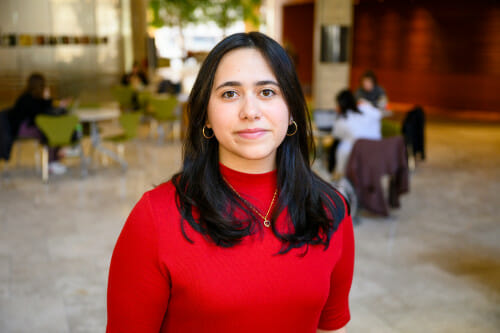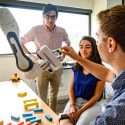New major in information science draws wide array of students with human-centered approach

From left to right, Natalia Torres, Maya Gadlin, and Omari Wilondja, all undergraduate information science majors, walk in front of the construction site that will become the School of Computer, Data & Information Sciences. Photo: Althea Dotzour
When it comes to helping Wisconsin residents and the state’s economy, you Can’t Stop a Badger. This February, see how our students get a career-ready education from day one. Follow along using #CantStopABadger on social media. Your support can help us continue this work.
As a high school student, Natalia Torres had little interest in computer science or programming. She rarely played video games and would never have considered herself an expert in technology.
Maya Gadlin had a very different childhood. A self-described STEM kid, she learned multiple computer languages, took an AP computer science course, and designed websites for herself and others.
Despite their contrasting backgrounds, both are now majoring in information science at UW–Madison. The new major, announced last May by the School of Computer, Data & Information Sciences, is designed to do just that — appeal to a wide array of undergraduates.
“With this major, we’re increasing access to technology curriculum and preparing a talent pipeline that will drive economic growth in the region and beyond,” says Alan Rubel, professor and director of the Information School (iSchool), where the new major is housed. “Our goal is to reach a diverse set of students, including those who may not have considered a path from social science and the humanities to computing, for example.”
Information science is proving popular — already, more than 70 students have declared it as their major since just last fall.

Natalia Torres Photo: Althea Dotzour
Torres, a sophomore from Sparta, Wisconsin, says her choice of information science can be a little confusing at first to those who knew her during her youth.
“When you hear ‘information science,’ you automatically think of having to take a lot of technology and math courses,” says Torres. “But if you really look into the major, it’s very broad. You can do a lot within it. I tell people it’s a way of using technology for the greater good.”
The new major focuses on the relationships between people, information and computing, says Stacy Harnett, the academic advising manager for the major at the iSchool. Graduates will be prepared with computing, analytical and people skills for a large variety of jobs in companies and organizations that need tech and data-savvy employees.
“It’s really about people’s interactions with data and technology and how we can use that knowledge to improve the well-being of people and their communities,” Harnett says.
Sample job titles include data analyst, information architect, product manager, digital media coordinator, database manager and user experience designer.
Torres arrived at UW–Madison curious about human behavior, social structures and other cultures. She thought she might major in anthropology, but after meeting with Harnett last fall, she became drawn to information science and its emphasis on the ethical, cultural and societal challenges inherent in the design and use of technology.
The information science major can be completed as a student’s sole program of study or as an additional major to complement a wide variety of programs. Torres has decided to pair information science with a second major in international studies. She hasn’t landed on a career path yet but is interested in the intersection of technology, politics and the law and could see herself advising a company or nonprofit organization on how technology impacts their goals and mission.
Torres is taking her first information science classes this semester, including Technology and Development in Africa and Beyond; Introduction to Cyber Law; and Introduction to Computation. The latter will be her first foray into computer science.
“I do want to learn a programming language, because that’s become such a big part of society,” Torres says. “But I also know that if I don’t end up liking it, I can still continue with the major and go a different direction.”
“With this major, we’re increasing access to technology curriculum and preparing a talent pipeline that will drive economic growth in the region and beyond.”
Alan Rubel
The new major has a flexible structure, Harnett says. While many majors are sequential in their course progression, information science allows for significant individualization. A technology background is not needed.
“You can decide how technical you want your major to be,” Harnett says. “That personalization piece really appeals to a broad cross-section of students.”
The breadth of the major can be seen in its course offerings. There are technical courses on computer programming, text mining and data set analysis, as well as courses on the history and future of books, the privacy ramifications of government information collection, and ethical issues around “big data.” Students can choose a concentration of courses that aligns with their interests and career goals. Six focus areas within the major serve as a guide to specialization: civic technologies; analytics; user experience design; information policy, law and ethics; health informatics; and information, data and society.

Maya Gadlin Photo: Althea Dotzour
Gadlin, a freshman from the New York City area, knew she wanted to study something related to computers — “I’m that person who fixes all the technology in the house,” she says. She came to UW–Madison in part because of its nationally known and highly respected computer science program, she says. But she wasn’t sure she wanted to go all-in with an IT-related career. Information science feels like a good fit, she says, because she’s interested in the psychology and ethics behind technology.
“A lot of companies hire information science majors because, in today’s economy, you always need to be thinking about how a certain product or technology is going to affect a community or a user,” she says. “I’ve been explaining the major to friends as the less technical side of computer science. It takes more of a humanities approach.”

Omari Wilondja Photo: Althea Dotzour
Sophomore Omari Wilondja of Milwaukee landed on information science during an internship last summer at Baird, a national financial advisory firm based in Milwaukee. He was exposed to many possible careers, including data analyst. He looked into options in that area at UW, saw the new information science major, and jumped on it. Wilondja especially likes the community of peers that has developed around the major and the individual attention.
“I’m a big fan of small class sizes, and that’s been my experience with the major so far,” he says. “You’re not just a number. The teachers are always available.”
He plans to pair his information science major with a certificate in data science from the Department of Statistics, also part of the School of Computer, Data & Information Sciences (CDIS).
“It’s very important to learn how to work with all these digital tools because they are around us 24 hours a day in so many career fields,” he says.
The information science major is one of a multitude of new programs offered by CDIS, including a master’s degrees in information. Formed in 2019, CDIS is home to three nationally ranked departments — Computer Sciences, Statistics, and the Information School — that advance the teaching and research of computing in the information age. All departments will be housed in the new CDIS building, which is scheduled to open in 2025.
For more information about the information science major, please contact iSciadvising@ischool.wisc.edu.
Subscribe to Wisconsin Ideas
Want more stories of the Wisconsin Idea in action? Sign-up for our monthly e-newsletter highlighting how Badgers are taking their education and research beyond the boundaries of the classroom to improve lives.



